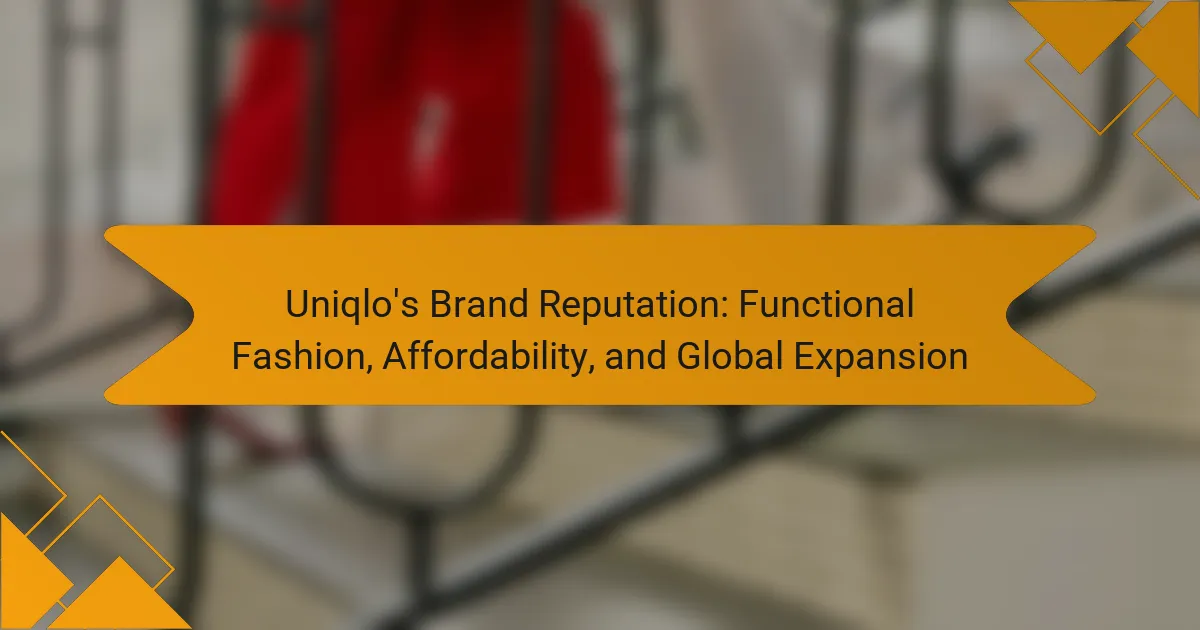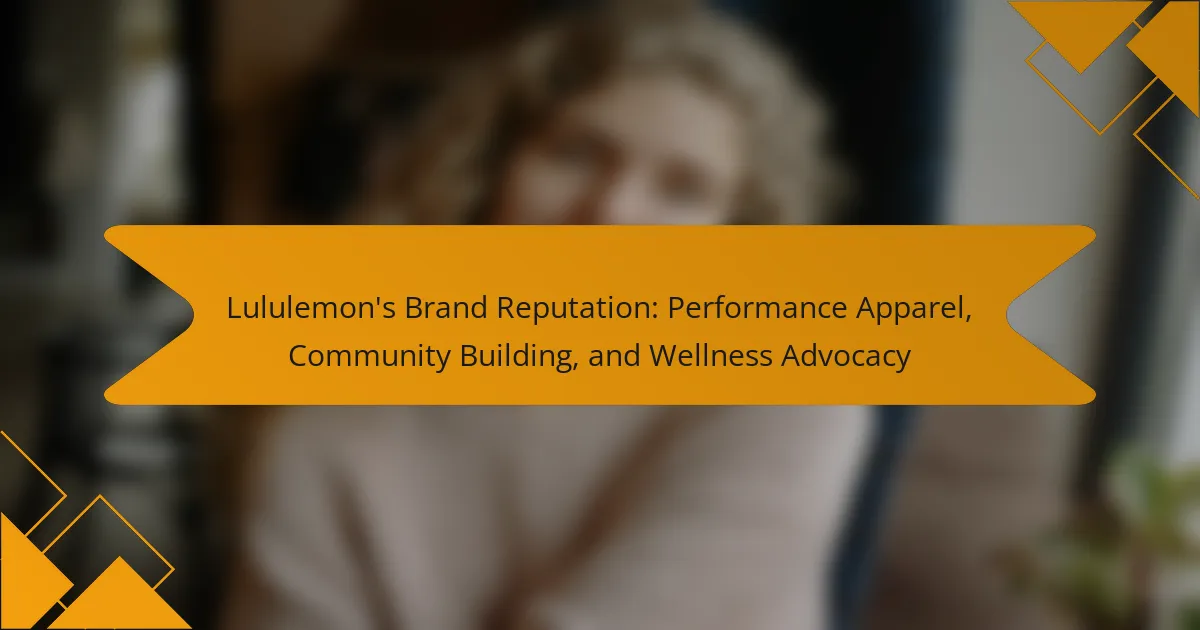Uniqlo is a global apparel brand known for its focus on functional fashion and affordability. The brand is recognized for delivering high-quality clothing at accessible prices, supported by innovative fabric technologies like Heattech and AIRism. Uniqlo’s marketing strategies emphasize simplicity and practicality, appealing to a diverse audience while fostering customer satisfaction. The company’s commitment to sustainability and eco-friendly practices is increasingly relevant in today’s market, influencing industry standards and consumer expectations. Additionally, Uniqlo’s successful global expansion highlights its value-driven business model and adaptability in a competitive landscape.

What is Uniqlo’s Brand Reputation?
Uniqlo’s brand reputation is characterized by its commitment to functional fashion and affordability. The brand is recognized for providing high-quality, stylish clothing at accessible prices. Uniqlo’s innovative fabric technology, such as Heattech and AIRism, enhances its appeal among consumers. The company has successfully expanded globally, establishing a presence in numerous countries. Customer satisfaction ratings consistently reflect positive experiences with product quality and value. Uniqlo’s marketing strategies emphasize simplicity and practicality, resonating with a wide audience. The brand’s sustainability initiatives further bolster its reputation in today’s eco-conscious market. Overall, Uniqlo is viewed as a reliable choice for everyday wear.
How does Uniqlo define functional fashion?
Uniqlo defines functional fashion as clothing designed to enhance everyday life through practicality and comfort. This approach emphasizes versatile styles that adapt to various environments and activities. Uniqlo focuses on high-quality materials that offer durability and ease of care. The brand incorporates innovative technologies, such as Heattech and AIRism, to improve wearability in different climates. Functional fashion also includes a commitment to affordability, ensuring that these practical garments are accessible to a wide audience. This philosophy is evident in Uniqlo’s product range, which balances style and utility for everyday consumers.
What are the key features of functional fashion at Uniqlo?
Functional fashion at Uniqlo emphasizes practicality, versatility, and comfort. The brand incorporates innovative materials like Heattech for warmth and AIRism for breathability. Uniqlo designs clothing that adapts to various lifestyles and weather conditions. The collections feature minimalist aesthetics suitable for layering. Functional elements include pockets, stretchable fabrics, and easy-care properties. Uniqlo’s commitment to affordability ensures that functional fashion remains accessible. The brand frequently collaborates with designers to enhance functionality and style. These features collectively position Uniqlo as a leader in the functional fashion segment.
How does functional fashion impact consumer choices?
Functional fashion significantly influences consumer choices by prioritizing practicality and versatility. Consumers often seek clothing that meets their daily needs while maintaining style. This trend is evident in the rising popularity of brands like Uniqlo, which emphasize functional attributes in their designs. Research shows that 70% of consumers consider functionality as a key factor in their purchasing decisions. Additionally, functional fashion often incorporates features such as moisture-wicking fabrics and adaptable styles. These attributes enhance the overall consumer experience. As a result, brands that focus on functional fashion can attract a broader audience and foster brand loyalty.
Why is affordability a core aspect of Uniqlo’s brand?
Affordability is a core aspect of Uniqlo’s brand because it aligns with their mission to provide high-quality clothing at accessible prices. The brand focuses on offering functional fashion that meets everyday needs without compromising on quality. Uniqlo employs efficient production methods and supply chain management to keep costs low. This strategy allows them to pass savings onto consumers. As a result, Uniqlo has positioned itself as a go-to brand for budget-conscious shoppers. Their pricing strategy has contributed to significant global expansion, making them competitive in various markets. Additionally, Uniqlo’s commitment to affordability enhances customer loyalty and brand reputation.
What pricing strategies does Uniqlo employ?
Uniqlo employs a cost leadership pricing strategy. This strategy focuses on offering high-quality products at competitive prices. Uniqlo achieves this by optimizing supply chain efficiency. They leverage economies of scale to reduce production costs. The brand also minimizes marketing expenses by relying on word-of-mouth and in-store experience. Furthermore, Uniqlo offers a limited range of styles to streamline production. This approach allows for consistent pricing across global markets. As a result, Uniqlo maintains affordability while ensuring product quality.
How does affordability influence brand loyalty?
Affordability significantly influences brand loyalty by making products accessible to a broader audience. When consumers perceive a brand as affordable, they are more likely to make repeat purchases. This repeated engagement fosters a sense of loyalty towards the brand. Research indicates that 70% of consumers consider price as a primary factor in their loyalty decisions. Brands that maintain competitive pricing often see higher customer retention rates. For example, Uniqlo’s pricing strategy has contributed to its strong customer base and loyalty. Affordability encourages consumers to choose a brand over its competitors, reinforcing their commitment to that brand.
What role does global expansion play in Uniqlo’s brand reputation?
Global expansion significantly enhances Uniqlo’s brand reputation. It allows the brand to reach diverse markets and increase visibility. By entering new regions, Uniqlo showcases its unique value proposition. The brand emphasizes functional fashion and affordability, appealing to a broad audience. Global presence also reinforces Uniqlo’s image as a leading retailer. According to Statista, Uniqlo operates over 2,300 stores worldwide as of 2023. This extensive footprint strengthens customer trust and loyalty. Additionally, global expansion facilitates collaboration with local designers, enriching product offerings. Overall, global growth is vital for Uniqlo’s reputation and market competitiveness.
How has Uniqlo approached international markets?
Uniqlo has approached international markets through a strategy focused on localization and affordability. The brand tailors its product offerings to meet the specific tastes and preferences of local consumers. Uniqlo emphasizes high-quality, functional clothing at accessible prices. The company has established a global presence by opening flagship stores in key cities worldwide. Additionally, Uniqlo invests in marketing campaigns that resonate with local cultures. This strategy has led to successful market [censured] in regions such as Asia, Europe, and North America. As of 2023, Uniqlo operates over 2,300 stores in 25 countries. This expansion strategy has significantly contributed to the brand’s global recognition and sales growth.
What challenges has Uniqlo faced in global expansion?
Uniqlo has faced several challenges in its global expansion. One significant challenge is adapting to local market preferences. Different regions have unique fashion tastes and climate needs. For instance, Uniqlo’s core offerings may not align with local demands in markets like Europe. Additionally, competition from established local brands poses a threat. In many countries, local retailers have strong brand loyalty. Furthermore, supply chain complexities can hinder efficient distribution. Uniqlo’s reliance on a just-in-time production model can lead to stock shortages in new markets. Lastly, cultural differences affect marketing strategies. Uniqlo must navigate various cultural norms to effectively engage consumers.
How do consumer perceptions shape Uniqlo’s reputation?
Consumer perceptions significantly shape Uniqlo’s reputation by influencing brand loyalty and market positioning. Positive perceptions arise from the brand’s commitment to quality and affordability. Uniqlo’s innovative fabric technologies, such as Heattech and AIRism, enhance consumer trust. The brand’s minimalist aesthetic appeals to a broad audience, reinforcing its image as a functional fashion leader. Social media plays a crucial role in shaping these perceptions, as consumers share their experiences and opinions. According to a 2021 survey, 78% of consumers view Uniqlo favorably for its value and style. Negative perceptions can arise from issues such as labor practices or sustainability concerns, impacting brand reputation. Overall, consumer feedback directly influences Uniqlo’s market success and brand evolution.
What factors contribute to positive consumer perceptions?
Positive consumer perceptions are influenced by product quality, brand reputation, and customer service. High-quality materials and craftsmanship lead to satisfaction. Uniqlo is known for its functional fashion, which appeals to practical consumers. The brand’s affordability enhances its attractiveness, making it accessible to a wider audience. Global expansion increases brand visibility and trust. Consistent positive experiences with customer service reinforce loyalty. Research shows that brands with strong reputations enjoy higher customer trust and advocacy. Uniqlo’s strategy aligns with these factors, contributing to its favorable consumer perceptions.
How does Uniqlo address negative feedback?
Uniqlo addresses negative feedback through a structured approach. The brand actively monitors customer feedback across various platforms. They analyze this feedback to identify recurring issues. Uniqlo implements changes based on this analysis to improve products and services. The company also engages directly with customers to resolve specific concerns. This direct engagement often occurs through social media and customer service channels. Uniqlo’s commitment to addressing feedback helps to enhance customer satisfaction. Their approach is evident in their continuous product development and service improvements.

What are the implications of Uniqlo’s brand reputation on the fashion industry?
Uniqlo’s brand reputation significantly influences the fashion industry by setting standards for functional and affordable clothing. The brand is known for its commitment to quality and innovation, which encourages competitors to enhance their product offerings. Uniqlo’s success in global markets demonstrates the viability of a value-driven business model. This has prompted other brands to adopt similar strategies to remain competitive. Additionally, Uniqlo’s focus on sustainability influences industry practices, pushing brands towards eco-friendly initiatives. The brand’s reputation for inclusivity also encourages diversity in fashion marketing and product design. Overall, Uniqlo’s impact fosters a shift towards more accessible and responsible fashion.
How does Uniqlo’s approach to sustainability affect its brand image?
Uniqlo’s approach to sustainability positively affects its brand image. The company emphasizes eco-friendly practices in production and materials. Uniqlo has committed to using 100% sustainably sourced cotton by 2025. This initiative enhances consumer trust and loyalty. Additionally, Uniqlo promotes recycling programs for its clothing. Such efforts align with growing consumer demand for sustainable fashion. The brand’s transparency in sustainability initiatives further strengthens its reputation. Studies show that consumers are more likely to support brands with strong sustainability practices. Thus, Uniqlo’s sustainability approach significantly enhances its overall brand perception.
What sustainable practices does Uniqlo implement?
Uniqlo implements several sustainable practices to reduce its environmental impact. The brand focuses on using recycled materials in its clothing production. Uniqlo has committed to reducing greenhouse gas emissions across its supply chain. The company promotes energy efficiency in its stores and facilities. Uniqlo also engages in water conservation initiatives during manufacturing. The brand’s “Re.UNIQLO” program encourages customers to recycle their used clothing. Uniqlo aims to achieve 100% sustainable cotton sourcing by 2025. These practices demonstrate Uniqlo’s commitment to sustainability in the fashion industry.
How do consumers respond to Uniqlo’s sustainability efforts?
Consumers generally respond positively to Uniqlo’s sustainability efforts. Many appreciate the brand’s commitment to reducing environmental impact. Uniqlo has implemented various initiatives, such as recycling programs and sustainable materials. A survey by McKinsey & Company indicated that 67% of consumers consider sustainability when making purchases. Additionally, Uniqlo’s use of eco-friendly fabrics has attracted environmentally conscious shoppers. Positive consumer feedback often highlights the balance between affordability and sustainability. Overall, Uniqlo’s efforts have enhanced its brand image among consumers.
What competitive advantages does Uniqlo gain from its brand reputation?
Uniqlo gains several competitive advantages from its strong brand reputation. First, it is perceived as a leader in functional fashion, which attracts consumers seeking quality and practicality. This reputation allows Uniqlo to command customer loyalty, as customers trust the brand for reliable products. Additionally, Uniqlo’s commitment to affordability enhances its appeal, making it accessible to a wider audience. The brand’s global presence further solidifies its reputation, enabling it to leverage economies of scale. Uniqlo’s innovative marketing strategies, such as collaborations with designers, also contribute to its favorable image. These factors collectively position Uniqlo favorably against competitors in the retail space.
How does brand reputation influence market share?
Brand reputation significantly influences market share by affecting consumer trust and purchasing decisions. A positive brand reputation leads to increased customer loyalty. Customers are more likely to choose a brand they perceive as reputable over competitors. This loyalty can result in higher sales and, consequently, a larger market share. For instance, Uniqlo’s reputation for quality and affordability attracts a broad customer base. According to a 2021 survey, brands with strong reputations can capture up to 70% more market share than those with weaker reputations. Thus, a strong brand reputation directly correlates with increased market share.
What differentiates Uniqlo from its competitors?
Uniqlo differentiates itself from competitors through its focus on functional fashion and affordability. The brand emphasizes high-quality, versatile clothing that caters to everyday needs. Uniqlo’s innovative technologies, such as HeatTech and AIRism, enhance comfort and performance. The brand’s commitment to simplicity and minimalism sets it apart in a crowded market. Uniqlo also maintains competitive pricing, making stylish clothing accessible to a broader audience. Its global expansion strategy ensures a consistent brand experience across diverse markets. This combination of functionality, affordability, and global presence creates a unique position for Uniqlo in the retail landscape.

What future trends may impact Uniqlo’s brand reputation?
Sustainability trends may significantly impact Uniqlo’s brand reputation. Consumers increasingly prioritize eco-friendly practices in fashion. Uniqlo’s commitment to sustainable materials and production methods will be scrutinized. The rise of digital and e-commerce shopping is reshaping consumer expectations. Uniqlo must enhance its online presence to remain competitive. Social media influence is growing, affecting brand perceptions rapidly. Customer engagement through platforms like Instagram can enhance reputation. Lastly, global economic shifts may influence affordability perceptions. Economic downturns could challenge Uniqlo’s pricing strategy and brand positioning.
How might changing consumer preferences affect Uniqlo?
Changing consumer preferences may significantly impact Uniqlo’s market position. As consumers increasingly prioritize sustainability, Uniqlo must adapt its product lines to include eco-friendly materials. Research indicates that 66% of global consumers are willing to pay more for sustainable brands. This shift could necessitate changes in sourcing and production processes for Uniqlo. Additionally, the rise of casual and athleisure wear influences Uniqlo’s offerings. The brand may need to enhance its activewear collection to align with these trends. Social media trends also drive consumer choices. Uniqlo’s engagement in digital marketing will be crucial to attract younger demographics. Meeting these evolving preferences will be essential for Uniqlo to maintain its competitive edge.
What emerging trends are relevant to Uniqlo’s market?
Sustainability is an emerging trend relevant to Uniqlo’s market. Consumers increasingly demand eco-friendly products and practices. Uniqlo has responded by launching initiatives like recycling programs. Digital transformation in retail is another trend. Online shopping and personalized experiences are gaining popularity. Uniqlo has enhanced its online platform to meet these demands. The athleisure trend continues to rise. Customers seek versatile clothing suitable for various occasions. Uniqlo’s product lines often reflect this trend. Additionally, collaborations with designers and artists are becoming more common. These partnerships attract diverse customer segments. Overall, these trends shape Uniqlo’s strategic direction in the competitive fashion market.
How can Uniqlo adapt to stay relevant in a changing market?
Uniqlo can adapt to stay relevant in a changing market by enhancing its product innovation. This includes incorporating sustainable materials and technologies in its clothing lines. The brand can also focus on expanding its online presence and improving e-commerce capabilities. Data shows that online shopping has surged, especially post-pandemic. Uniqlo should leverage data analytics to understand consumer preferences better. Additionally, collaborating with designers and influencers can attract new customer demographics. Market research indicates that collaborations can drive brand engagement. Lastly, maintaining competitive pricing while ensuring quality will help retain customer loyalty. This strategy aligns with Uniqlo’s core value of affordability.
What best practices can Uniqlo adopt to maintain a strong brand reputation?
Uniqlo can maintain a strong brand reputation by focusing on quality, sustainability, and customer engagement. Prioritizing high-quality materials ensures customer satisfaction and loyalty. Implementing sustainable practices in sourcing and production can enhance brand image. Engaging with customers through social media fosters community and strengthens brand connection. Transparency in operations builds trust and credibility. Regularly seeking customer feedback helps address concerns promptly. Collaborating with influential designers can enhance brand appeal. Lastly, consistent marketing efforts that align with brand values reinforce Uniqlo’s identity.
How can Uniqlo enhance customer engagement?
Uniqlo can enhance customer engagement by leveraging personalized marketing strategies. Personalized recommendations can increase customer satisfaction and loyalty. Implementing a robust loyalty program encourages repeat purchases. Engaging customers through social media platforms fosters community and brand connection. Providing interactive in-store experiences can elevate customer interaction. Utilizing customer feedback for product development shows responsiveness to consumer needs. Offering exclusive online content or promotions can drive digital engagement. Collaborating with influencers can expand reach and attract new customers.
What strategies can Uniqlo use to improve brand perception?
Uniqlo can improve brand perception by enhancing customer engagement through personalized marketing. This approach tailors communication to individual preferences, fostering a deeper connection. Implementing sustainability initiatives can also strengthen brand perception. Consumers increasingly favor brands that prioritize eco-friendly practices. Expanding collaborations with well-known designers can elevate the brand’s image. Collaborations often attract new customer segments and generate buzz. Additionally, improving in-store experiences can enhance customer satisfaction. A seamless shopping environment encourages repeat visits. Lastly, leveraging social media for authentic storytelling can build trust. Sharing real customer experiences can humanize the brand and resonate with audiences.
Uniqlo is the primary entity discussed in the article, focusing on its brand reputation characterized by functional fashion, affordability, and global expansion. The article examines Uniqlo’s commitment to high-quality, stylish clothing at accessible prices, highlighting innovative fabric technologies like Heattech and AIRism. It further explores how functional fashion influences consumer choices, the significance of affordability in brand loyalty, and the impact of global expansion on Uniqlo’s market presence. Additionally, the article addresses the brand’s sustainability efforts and how they shape consumer perceptions, ultimately influencing Uniqlo’s competitive advantages and future trends in the fashion industry.


